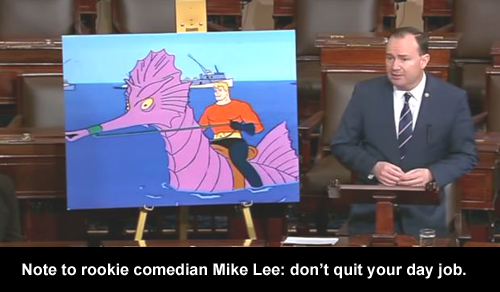Senate Republicans tried-on their comedy shoes this week, “debating” something they were breezily referring to as the Green New Deal but which was actually just a straw horse resolution they whacked like a pinata to show how proudly retrograde they are. In the wake of the Typhoon in Mozambique and other recent climate-fueled disasters, this was a pretty remarkable exercise in ignorance and tone-deafness. No, I don’t expect anything better from what Noam Chomsky has accurately described as the most dangerous organization in human history. The Republicans literally stand alone in the world as the only major party that rejects the science of climate change. Quite a distinction.
Not that there isn’t some value in such a spectacle. It certainly focuses the mind on how much work we have to do. My hope is that all of my leftist and progressive friends and colleagues fully understand just how difficult this climate fight will be. This is not just about developing and advocating for big ideas. We can only move this process forward by mounting an effective inside/outside strategy – organizing a large, broad mobilization out in the communities and electing the most progressive politicians we can possibly elect. We need to do more than just win power, which will be hard enough. We have to hold and sustain power over the next decade and a half particularly, as that is pretty much all the time we have left to turn this ship around. That will take an enormous effort and, really, a new kind of politics that makes a material difference in the lives of ordinary people.

How are we going to convince millions upon millions of Americans to go with this Green New Deal framework? Well, part of the challenge is that climate change is what may be called a genuinely hard problem. There’s the tendency to compare climate change to the Great Depression, but that’s kind of misleading. Yes, the Depression affected almost everyone in the country, but its worst effects could be mitigated by some money in your pocket. Massive collective effort in the 1930s had the potential to provide relief relatively rapidly – relief that would be felt by a large segment of society. Climate change is more complicated. We can’t tell people that, if you do this important work, the climate will be noticeably better – that’s just not likely. We’re asking people to save the world for future generations … and it’s just possible that our best efforts might not even accomplish that. So in addition to emphasizing that concern for future generations, we need to flesh out the “new deal” component of the plan … the part that will deliver some level of equity and prosperity to ordinary Americans.
Don’t get me wrong – I am 100% in favor of a Green New Deal. But let’s proceed with our eyes open. This won’t be a cake walk.
luv u,
jp
